人教版必修一辅导讲义:Unit1 Friendship(2)
高考英语一轮复习Unit1Friendship讲义新人教版必修1

Unit 1 Friendship一、刷黑板——词汇全听写先过识记默写关Ⅰ.阅读词汇(英译汉)[第一屏听写]1.survey n.调查;测验2.loose adj.松的;松开的3.vet n. 兽医4.Jewish adj.犹太人的;犹太族的5.German adj.德国的;德国人的;德语的n. 德国人;德语6.spellbind vt.迷住;迷惑7.thunder vi.打雷;雷鸣n. 雷;雷声[第二屏听写]8.curtain n.窗帘;门帘;幕布9.loneliness n. 孤单;寂寞10.highway n. 公路;大路11.suitcase n. 手提箱;衣箱12.overcoat n. 大衣;外套13.gossip vi.&n. 闲话;闲谈14.secondly adv. 第二;其次15.swap vt.交换16.item n. 项目;条款[第三屏听写]Ⅱ.高频词汇(汉译英)1.upset adj.心烦意乱的;不安的;不适的vt.使不安;使心烦;打翻2.ignore vt.不理睬;忽视3.calm vt.&vi.(使)平静;(使)镇定adj.平静的;镇静的;沉着的4.concern vt.(使)担忧;涉及;关系到n. 担心;关注;(利害)关系[第四屏听写]5.series n.连续;系列6.outdoors adv. 在户外;在野外7.dusk n. 黄昏;傍晚8.entire adj.整个的;完全的;全部的9.entirely adv. 完全地;全然地;整个地10.power n. 能力;力量;权力[第五屏听写]11.partner n.伙伴;合作者;合伙人12.dusty adj.积满灰尘的13.settle vi.安家;定居;停留vt.使定居;安排;解决14.suffer vt.&vi.遭受;忍受;经历15.recover vi.&vt.痊愈;恢复;重新获得16.pack vi.&vt.捆扎;包装;打行李n. 小包;包裹[第六屏听写]17.teenager n.十几岁的青少年18.exactly adv. 确实如此;正是;确切地19.disagree vi.不同意20.grateful adj.感激的;表示谢意的21.dislike n.&vt.不喜欢;厌恶22.tip n. 提示;技巧;尖;尖端;小费vt.倾斜;翻倒23.add_up 合计[第七屏听写]24.calm_(...)_down (使)平静下来;(使)镇定下来25.have_got_to 不得不;必须26.be_concerned_about 关心;挂念27.walk_the_dog 遛狗28.go_through 经历;经受29.set_down 记下;放下;登记30.a_series_of 一连串的;一系列;一套31.on_purpose 故意32.in_order_to 为了……[第八屏听写]33.at_dusk 在黄昏时刻34.face_to_face 面对面地35.no_longer/not_...any_longer 不再……36.suffer_from 遭受;患病37.get/be_tired_of 对……厌烦38.pack_(sth.)_up 将(东西)装箱打包39.get_along_with 与……相处;进展40.fall_in_love 相爱;爱上41.join_in 参加;加入二、刷清单——热身自盘点再过基本应用关(一)核心单词(四)初中考点再回顾一、过重点单词——纵引横联超人一点1.upset adj.心烦意乱的;不安的;不适的vt.使不安;使心烦;打翻 [教材原句] Your friend comes to school very upset . 你的朋友来上学时心情很不好。
人教版高中英语必修一教案Unit 1 Friendship (含答案)
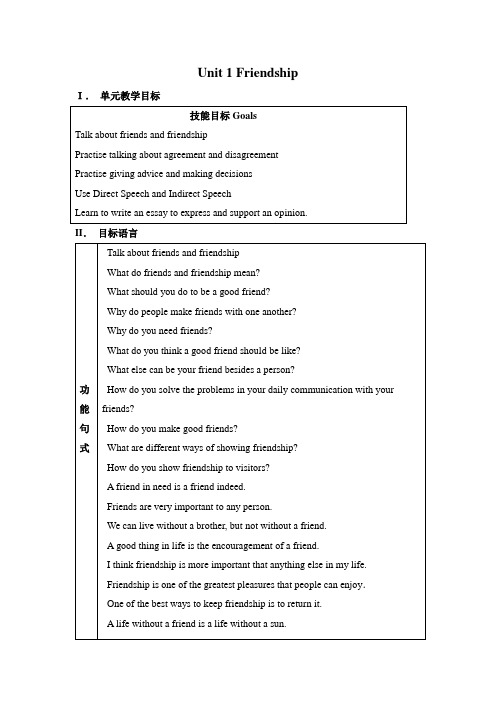
Unit 1 Friendship I.单元教学目标II.目标语言III. 教材分析和教材重组1. 教材分析本单元以Friend和Friendship为话题,旨在通过单元教学使学生通过讨论什么是好朋友,什么是真正的友谊,如何交友和保持友谊等问题,使学生树立正确的交友观。
并针对日常交友过程中经常遇到的实际问题,指导学生发表自己的见解和看法,通过进一步讨论提供有效的解决方案。
并能就此以编辑的身份写出指导信,对相关谚语写出观点明确、论证有力的短文。
1.1 Warming Up以调查问卷的形式,通过对学生在日常交友过程中所遇到的五个问题,展开调查,使学生对是否擅长交友做出评价,激发学生对本单元的中心话题产生兴趣;同时也使教师本单元的授课更具有针对性,从而有效地帮助学生树立正确的交友观。
1.2 Pre-Reading通过四个问题引导学生讨论交友的重要性以及自己心目中好朋友的概念和标准,并使学生认识到不仅人与人,人与物(如日记)也可以成为好朋友。
继续探究并树立正确交友观,并为阅读作好了准备。
1.3 Reading讲述第二次世界大战的纳粹统治时期,犹太人Anne一家过着滇沛流漓,与世隔绝的生活。
Anne在孤独中只能以日记Kitty 为友,倾诉衷肠,伴其渡过两年的逃亡生涯。
控诉了纳粹党的残暴统治给犹太人民带来了深重的灾难,并以日记的形式表达了以主人公Anne为代表的全世界人民憎恨战争渴望和平的共同心愿。
学生学习了新的词汇、句型,提高了阅读水平。
文中选用了主人公的一篇日记,使学生进一步感受到了挚友的可贵,对主人公内心世界的描写有了更深刻的理解。
1.4 Comprehension 设计了三种题型。
其中前两个是考查学生对READING文章细节内容的理解,最后一题是开放性问题,学生可以在更深入理解主人公内心世界的基础上各抒己见,使学生养成勤于思考勇于探究的良好的学习习惯,现时也培养了学生的想象力,进一步提高了阅读水平。
高中一轮复习英语讲义必修一Unit1Friendship

Unit 1 Friendship一、刷黑板——词汇全听写(先过识记默写关)Ⅰ.阅读词汇(英译汉)[第一屏听写]1.survey n.调查;测验2.loose adj.松的;松开的3.vet n. 兽医4.Jewish adj.犹太人的;犹太族的5.German adj.德国的;德国人的;德语的n. 德国人;德语6.spellbind v t.迷住;迷惑7.thunder v i.打雷;雷鸣n. 雷;雷声[第二屏听写]8.curtain n.窗帘;门帘;幕布9.loneliness n. 孤单;寂寞10.highway n. 公路;大路11.suitcase n. 手提箱;衣箱12.overcoat n. 大衣;外套13.gossip v i.&n. 闲话;闲谈14.secondly ad v. 第二;其次15.swap v t.交换16.item n. 项目;条款[第三屏听写]Ⅱ.高频词汇(汉译英)1.upset adj.心烦意乱的;不安的;不适的v t.使不安;使心烦;打翻2.ignore v t.不理睬;忽视3.calm v t.&v i.(使)平静;(使)镇定adj.平静的;镇静的;沉着的4.concern v t.(使)担忧;涉及;关系到n. 担心;关注;(利害)关系[第四屏听写]5.series n.连续;系列6.outdoors ad v. 在户外;在野外7.dusk n. 黄昏;傍晚8.entire adj.整个的;完全的;全部的9.entirely ad v. 完全地;全然地;整个地10.power n. 能力;力量;权力[第五屏听写]11.partner n.伙伴;合作者;合伙人12.dusty adj.积满灰尘的13.settle v i.安家;定居;停留v t.使定居;安排;解决14.suffer v t.&v i.遭受;忍受;经历15.recover v i.&v t.痊愈;恢复;重新获得16.pack v i.&v t.捆扎;包装;打行李n. 小包;包裹[第六屏听写]17.teenager n.十几岁的青少年18.exactly ad v. 确实如此;正是;确切地19.disagree v i.不同意20.grateful adj.感激的;表示谢意的21.dislike n.&v t.不喜欢;厌恶22.tip n. 提示;技巧;尖;尖端;小费v t.倾斜;翻倒23.add_up 合计[第七屏听写]24.calm_(...)_down(使)平静下来;(使)镇定下来25.have_got_to 不得不;必须26.be_concerned_about 关心;挂念27.walk_the_dog 遛狗28.go_through 经历;经受29.set_down 记下;放下;登记30.a_series_of 一连串的;一系列;一套31.on_purpose 故意32.in_order_to 为了……[第八屏听写]33.at_dusk在黄昏时刻34.face_to_face 面对面地35.no_longer/not_...any_longer 不再……36.suffer_from 遭受;患病37.get/be_tired_of 对……厌烦38.pack_(sth.)_up 将(东西)装箱打包39.get_along_with 与……相处;进展40.fall_in_love 相爱;爱上41.join_in 参加;加入二、刷清单——热身自盘点(再过基本应用关) (一)核心单词(四)初中考点再回顾一、过重点单词——纵引横联超人一点1.upset adj.心烦意乱的;不安的;不适的v t.使不安;使心烦;打翻 [教材原句] Your friend comes to school very upset . 你的朋友来上学时心情很不好。
人教新课标高中英语必修一Unit1Friendship教案(2)
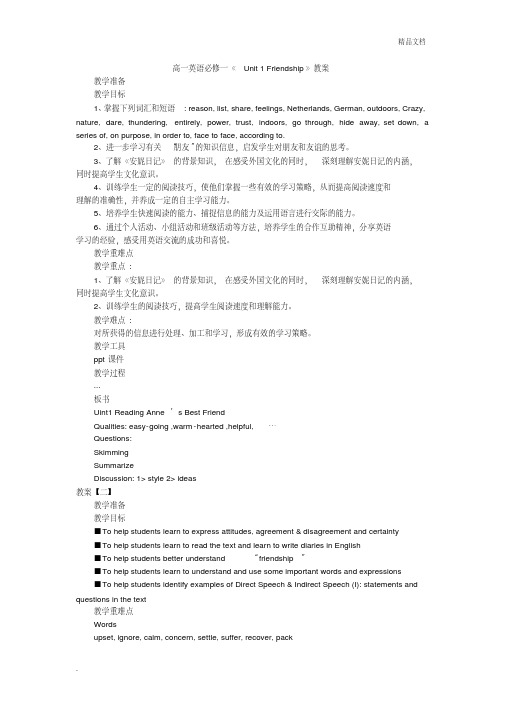
教学重点 :
1、了解《安妮日记》 的背景知识, 在感受外国文化的同时, 深刻理解安妮日记的内涵,
同时提高学生文化意识。
2、训练学生的阅读技巧,提高学生阅读速度和理解能力。
教学难点 :
对所获得的信息进行处理、加工和学习,形成有效的学习策略。
教学工具
ppt 课件
教学过程 ...
板书
Uint1 Reading Anne ’s Best Friend
精品文档
高一英语必修一《 Unit 1 Friendship 》教案
教学准备
教学目标
1、掌握下列词汇和短语 : reason, list, share, feelings, Netherlands, German, outdoors, Crazy,
nature, dare, thundering, entirely, power, trust, indoors, go through, hide away, set down, a
■To help students identify examples of Direct Speech & Indirect Speech (I): statements and
questions in the text 教学重难点
Words
upset, ignore, calm, concern, settle, suffer, recover, pack
4、训练学生一定的阅读技巧,使他们掌握一些有效的学习策略,从而提高阅读速度和
理解的准确性,并养成一定的自主学习能力。
5、培养学生快速阅读的能力、捕捉信息的能力及运用语言进行交际的能力。
6、通过个人活动、小组活动和班级活动等方法,培养学生的合作互助精神,分享英语
人教版高中英语必修1+Unit1Friendship--Period2教案2.doc

Unit 1 FriendshipPeriod 2 A sample lesson plan for Learning about Language (Direct & Indirect Speech<Ⅰ> statements & questions) IntroductionIn this period students will be helped by the teacher first to discover useful words and expressions, and then to discover and use useful structures: Direct & Indirect Speech(Ⅰ) statements & questions.Objectives■To help students understand and use direct and indirectspeech in statements and questions■To help students learn to use some useful words andexpressionsProcedures1. Warming up by reading aloudReading and reading aloud are the two very important things to do while learning English. So, to begin with, you are to read the text on page 2 aloud to the tape. Let’s see who read aloud with the best pronunciation and intonation.2. Discovering words and expressionsTurn to page 4 and do Exercises1, 2and 3. Then make a check on your answers.3. Learning about grammar⑴Direct speechIn direct speech, the original speaker's exact words are given and are indicated by quotation marks.★“I don’t know what to do,” said Dean.In some grammar books, ‘said Dean’ is referred to as a reporting clause. “I don't know what to do,” is referred to as the reported clause.⑵Indirect speechIn indirect speech, the exact meaning of the speaker’s words is given, but the exact words are not directly quoted.★Dean said that he didn’t know what to do.To convert direct speech into indirect speech:If the main verb is past tense, present tense verbs in ‘that clause’ must also be c hanged to past tense.Dean said that he didn’t know what to do.First and second person pronouns must be changed to third person pronouns.Dean said that he didn’t know what to do.(The word ‘that’ can often be left out: Dean said he didn’t know what to do.)⑶Indirect questionsThe same rules apply to indirect questions as to indirect statements. The difference is that a ‘wh- clause’ is used instead of a ‘that clause’.In telling a story or recounting events, a speaker using direct speech has all the resources of intonation to produce a lively account. Because indirect speech is always speech reported by someone else, the account is more reserved and restrained.The ability to change direct speech into indirect speech is a useful skill for those engaged in taking the minutes of a meeting or reporting on events.4. Discovering useful structuresNow let’s go to page 5 to do the three exercises in order to consolidate our studies of the directspeech and indirect speech.5. Closing down by taking a quiz品味人生1、不管鸟的翅膀多么完美,如果不凭借空气,鸟就永远飞不到高空。
人教版高中英语必修1教案Unit1Friendship
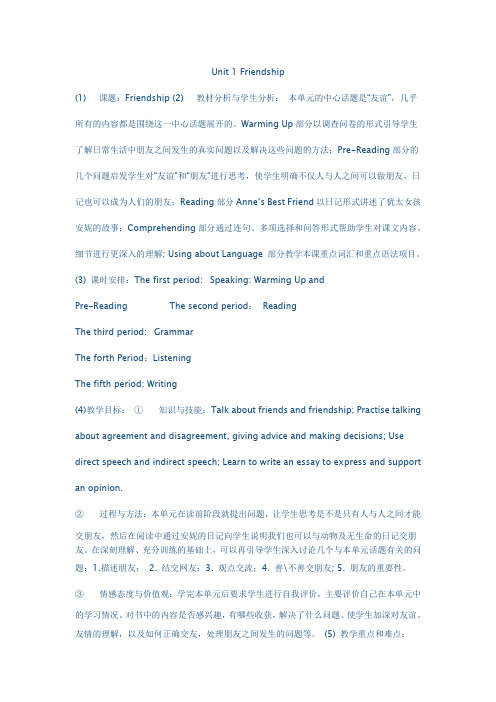
Unit 1 Friendship(1) 课题:Friendship (2) 教材分析与学生分析:本单元的中心话题是“友谊”,几乎所有的内容都是围绕这一中心话题展开的。
Warming Up部分以调查问卷的形式引导学生了解日常生活中朋友之间发生的真实问题以及解决这些问题的方法;Pre-Reading部分的几个问题启发学生对“友谊”和“朋友”进行思考,使学生明确不仅人与人之间可以做朋友,日记也可以成为人们的朋友;Reading部分Anne’s Best Friend以日记形式讲述了犹太女孩安妮的故事;Comprehending部分通过连句、多项选择和问答形式帮助学生对课文内容、细节进行更深入的理解; Using about Language 部分教学本课重点词汇和重点语法项目。
(3) 课时安排:The first period: Speaking: Warming Up andPre-Reading The second period: ReadingThe third period: GrammarThe forth Period:ListeningThe fifth period: Writing(4)教学目标:①知识与技能:Talk about friends and friendship; Practise talking about agreement and disagreement, giving advice and making decisions; Use direct speech and indirect speech; Learn to write an essay to express and support an opinion.②过程与方法:本单元在读前阶段就提出问题,让学生思考是不是只有人与人之间才能交朋友,然后在阅读中通过安妮的日记向学生说明我们也可以与动物及无生命的日记交朋友。
人教版高中英语必修一:unit1 Friendship2 课件

Language Difficulties
3.Your friend comes to school very upset. The bell rings so you need to go to class. You will A. ignore the bell and go somewhere quiet to calm your friends down. B. tell your friend that you’ve got to go to class. C. tell your friend that you are concerned about him/her and you will meet after class and talk then.
Lead-in
What qualities should a good friend have? Discuss with your partner and list three most important words.
active brave careful clever
generous selfless easy-going reliable
Warming up
Are you good to your friends?
Warming up
Scoring sheet for the survey 1A1 B3 C2 3A1 B2 C3 5A0 B3 C0 2A1 B2 C3 4A3 B2 C1
Warming up Values of friendship
Language Difficulties
upset 1. He was horribly upset over her illness. 2. I'm suffering from an upset stomach. 3. The bad news upset me. 4. It upset him that nobody had told him about it. 5. It upsets me to think of her all alone in that big house. 6. Don't upset the boat.
人教版高中英语必修1-Unit1《Friendship》 课件 (共26张PPT)
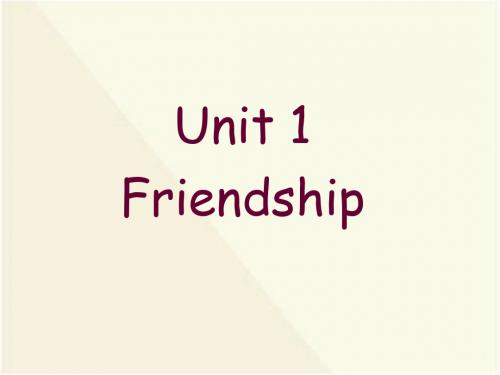
4---8
You are always thinking about yourself. You should care more about your friends. If you continue to be self-centered and don’t consider others’ feelings, you won’t make more friends and keep friendship for long.
brave
Good friend
kindhearted
careful
patient
helpful
understanding
unselfish
A good friend is someone who is…
Remember:
Make new friends and keep the old;
one is silver and the other is gold.
即学即用 This novel was concerned_A____the Second World
War,while most teenagers are more concerned______the hero’s love story. A.with;about B.with;at C.for;about D.about;with
Have you got to get up early tomorrow? We haven’t got to get up early tomorrow. It’ getting dark .I have( got) to go home now.
7.conLeabharlann ern挂念,关心 be concerned about / for…
高一英语Unit-1-Friendship-2教案人教版必修1

Unit 1 FriendshipTeaching goals:*语言知识1.to talk about friends and friendship, and interpersonal relationship2.to practise expressing attitudes, agreement and disagreement, and certainty3.to master some sentences about giving advice4.to learn to use the Direct Speech and Indirect Speech(1): statements and questions5.to learn about communication skills*语言技能和学习策略1.to develop listening skills by doing exercises in listening task2.to develop speaking skills by finishing the speaking task and other activities likediscussion and oral practice3.to develop reading skills through the reading materials in this unit4.to learn to write a letter of advice*文化意识1.to know about friend and the real meaning of friend2.to learn how to get along with others*情感态度1.to arouse the interest in learning English2.to learn to express their feeling of friends and friendshipTeaching key points:1.how to improve students’ speaking and cooperating abilities2.learn to use the Direct Speech and Indirect Speech(1):statements and questions3.master some words and expressionsTeaching difficult points:1.train the students’ speaking, listening, reading and writing abilities2.how to improve students’ cooperating abilitiesTeaching methods:Student-focus approach and task-based approachLearning methods:Cooperative studyTeaching aids:ComputerThe First Period (Warming up &Speaking)Teaching aims:1.to know about different kinds of friendship2.to learn some words of describing friend and friendship3.to master some useful words and expressionsTeaching methods:1.discussing2.cooperative learningTeaching materials: Warming upTeaching procedures:Step One: Leading-in1.Free talk: Something about friend and friendshipAsk the Ss to describe one of their friends----their appearance, personality, hobbies, etc.Qs: W hat’s your friend like?What does he/she like to do in his/her spare time?What personality does he/she have?Step Two: Discussion1.Writing the following statement on the blackboardWe all agree that to have a good friend , you need to be a good friend.2.Ask the Ss:What do you think of this statement and how can you be a good friend?Let the Ss express their views3. Have the Ss get into groups of four to list some qualities of a person they wouldlike as a friend.Ss may list: honest, friendly, open-minded, generous, helpful, patient, good-tempered, trustworthy, careful, full of love, caring, responsible, interesting, brave, easygoing, outgoing, warm-hearted, kind, selfness, tolerant, intelligent…4. Have a member of each group report on what their lists have and list them on the blackboard5. Ask the class whether or not they agree with all the qualities listedStep Three: Doing the survey and explanation1.Have the Ss do the survey in the textbook and let them work out their score.2.Teacher explain each itemQuestion 1 deal with how thoughtful you are towards others. The scoring reflects your concern for others. So one point for A gets the lowest score because it is the most selfish response. B get the highest score because it show a concern for your friend as well as your wish to go to see a film. C gets a slightly lower score because although it shows you want to go with your friend ( because you change the plan), you do not help your friend.Question 2 is concerned with fairness. A gets the lowest score because you are not giving your friend another chance to behave better this time.B gets a higher score because you let your friend borrow the camera again. This shows kindness and forgiveness or the trouble you had when it was returned broken. But you are not balancing his heeds against your own. That is why C gets the highest score. You are showing your friend that you will trust him/her with the camera again but this time you are giving him / her rules in case it gets broken.Question 3 deals with your concern for others. A get the lowest score because you would put anything else that needed to be done aside and concentrate only on yourfriend. This is not responsible. You have things that you need to do. Of course your friend is important but not more important than you responsibilities. B gets a higher score because it shows some concern for your friend and some understanding that you have important things to do too. But it does not show any real interest in his / her problem. C get the highest score because it not only shows concern for your friend but a recognition that you have responsibilities too.Question 4 is concerned with responsibilities to a friend. A provides the correct amount of responsibility to your friend. You recognize that it was your fault and will put it right and pay for the damage. So it gets the highest score. B provides some understanding that you are responsible. You put the situation right but you do not pay for the damage yourself. So it does not get the highest score. C gets the lowest score because you expect your friend to pay for your mistakes even though you were doing your friend a favour.Question 5is concerned with honesty. If you let your friend look at your paper or somebody else’s paper, you are helping them to c heat. That is not honest, so answers A and C get no marks. But it takes courage to tell your friend that they should have studied and that they cannot look at your paper. That is also the honest answer. So you get 6 points for B, which is more than any other in the quiz.Step Four: Language pointsTeacher explain language points with some slides1.add v.1) to put together with something else so as to increase the number, size, importance,etc. 增加,添加eg. Please add something to what I’ve said, John.2) to join numbers, amount, etc so as to find the totaleg. Add up these figure for me, please.常用结构:add up / together sth. 把…加起来,合计add sth. to sth. 把…加到/进add to (=increase) 增加了…add up to 合计,共计add in 包括…,算进2.pay to get it repaired花钱让人去修理3.upset adj. worred; annoyed 不安的;使心烦意乱的v. cause to worry, to be sad, to be angry, not to be calm, etc. 使不安;使心烦意乱eg. He was upset when he heard the news.His cheating in the exam upset his teacher.4.ignore vt. to pay no attention to sth. 忽视;对…不予理睬eg. Ignore the child if he misbehaves and he’ll stop soon.ignorant adj.无知的;不知的ignorance n. 无知;愚昧5. calm vt. to make sth./ sb. become quiet 使镇静;使平静adj. not excited, nervous or upset 镇静的;沉着的calm down 镇静;平静calm down sb.=calm sb. Down 使某人镇静sb. calm down(vi.) 某人平静下来eg. The excited girl quickly calmed down.He took a few deep breaths to calm himself down.6.have got to do sth.(口语)=have to do sth.不得不做某事;必须做某事eg. Since you’re no longer a child now, you have got to make money to support th e family.*have got to在变疑问句或否定句时,不再另加助动词,而have to则须加助动词do.have got to前不用情态动词,而have to前则可以。
人教版高一英语必修1 Unit 1 Friendship 同步教案(2)
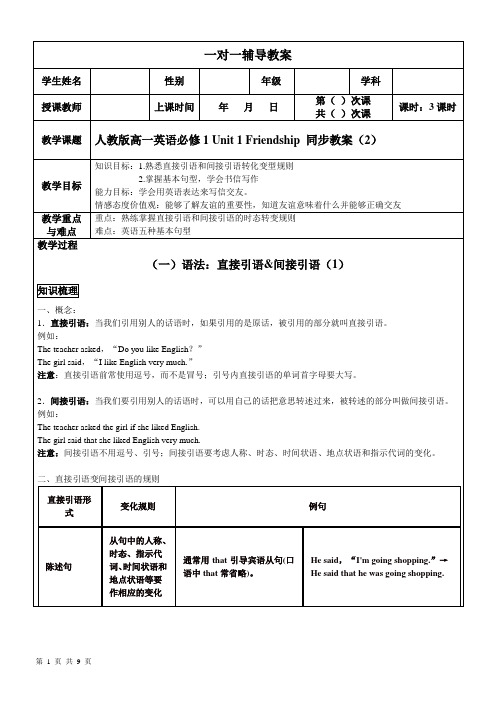
第1页共9页
一般疑问 句、选择疑 问句、反义 疑问句
ቤተ መጻሕፍቲ ባይዱ
①用 whether/if 引导宾语从 句,从句改为陈述语序,问号 改为句号; ②主句谓语动词为 said,则改 为 asked; ③主句谓语动词后没有间接 宾语,可以加一个间接宾语 me,him,her,us 等。
She said“Is your father at home?” → She asked me whether my father was at home.
My mother __________________ she ___________________________ her things in the suitcase very quickly.
Key: 1.told;me;she;was;then
2.she;would;me
4.his;father;had;bought;him;the;week;before
三、时态的变化 如主句的谓语动词是一般过去时,直接引语变间接引语时,从句的谓语动词在时态方面要作相应的变化;
如主句的谓语动词是现在时,从句的时态则无需变化。
时态的变化
直接引语
例句
间接引语
一般现在时 →一般过去时
He said,“I'm a teacher now.”
He said that he was a teacher then.
巧学助记 直接引语变为间接引语的口诀 (1)当直接引语为陈述句时,变间接引语的记忆口诀: 去掉引号加 that,人称变化要灵活。时态向后退一步,状语变化按规则。 (2)当直接引语为一般疑问句时,变间接引语的记忆口诀: 去掉引号加 if,陈述语序要记住。时态人称和状语,小心变化别马虎。 (3)当直接引语是特殊疑问句时,变间接引语的记忆口诀: 直接去引号,陈述莫忘掉。小心助动词,去它最重要。 (4)人称代词的变化口诀: ①“一随主。”若直接引语中有第一人称,变间接引语时应与主句中主语的人称相一致。 ②“二随宾。”若直接引语中有第二人称,变间接引语时应与主句中宾语的人称相一致。 ③“第三人称不更新。”直接引语中的第三人称变间接引语时不需要变化。
人教版高一英语必修1---Unit-1-Friendship--知识点总结

人教版高一英语必修1 Unit 1 Friendship 知识点总结Part 1. Warming up1.介词不同,含义有别:be good to sb./sth. 对… 好be good for sb./sth. 对… 有好处be good at (doing) sth. 擅长,精通be good with sb./sth. 善于应付… 的eg. She was very good to me when I was ill.Doing morning exercises is good for health.Tim is good at speaking English.Mary is good with her hands. 玛丽手很巧。
He is very good with children. 他对孩子很有一套。
2.add up 合计,把…加起来add up to 合计达到…add to 增加,增添add A to B 把…加进…里面,把…和…相加eg. Please add these figures up.These figures add up to 900.The bad weather added to our difficulities.Please add some salt to the water.If you add three to four, you get seven.Add three to four and you get seven.Three added to four is seven.▲add vt. 补充说(后接that从句或者直接引语)Eg. He added that they would return in a week.“And don’t be late,”she added.3.简单复习until与not … untilfinish sth./doing sth.help sb.(to) do sth.another time 改时间,改天4.pay to do sth. 花钱做某事eg. Y ou have to pay to attend the lecture. 参加这个讲座你需付费。
人教版高中英语必修一教案:Unit+1+Friendship+(2).doc
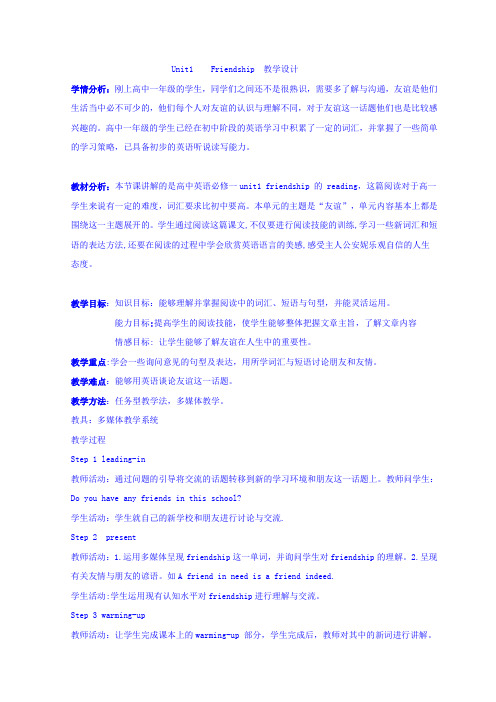
Unit1 Friendship 教学设计学情分析:刚上高中一年级的学生,同学们之间还不是很熟识,需要多了解与沟通,友谊是他们生活当中必不可少的,他们每个人对友谊的认识与理解不同,对于友谊这一话题他们也是比较感兴趣的。
高中一年级的学生已经在初中阶段的英语学习中积累了一定的词汇,并掌握了一些简单的学习策略,已具备初步的英语听说读写能力。
教材分析:本节课讲解的是高中英语必修一unit1 friendship 的 reading,这篇阅读对于高一学生来说有一定的难度,词汇要求比初中要高。
本单元的主题是“友谊”,单元内容基本上都是围绕这一主题展开的。
学生通过阅读这篇课文,不仅要进行阅读技能的训练,学习一些新词汇和短语的表达方法,还要在阅读的过程中学会欣赏英语语言的美感,感受主人公安妮乐观自信的人生态度。
教学目标:知识目标:能够理解并掌握阅读中的词汇、短语与句型,并能灵活运用。
能力目标:提高学生的阅读技能,使学生能够整体把握文章主旨,了解文章内容情感目标: 让学生能够了解友谊在人生中的重要性。
教学重点:学会一些询问意见的句型及表达,用所学词汇与短语讨论朋友和友情。
教学难点:能够用英语谈论友谊这一话题。
教学方法:任务型教学法,多媒体教学。
教具:多媒体教学系统教学过程Step 1 leading-in教师活动:通过问题的引导将交流的话题转移到新的学习环境和朋友这一话题上。
教师问学生:Do you have any friends in this school?学生活动:学生就自己的新学校和朋友进行讨论与交流.Step 2 present教师活动:1.运用多媒体呈现friendship这一单词,并询问学生对friendship的理解。
2.呈现有关友情与朋友的谚语。
如A friend in need is a friend indeed.学生活动:学生运用现有认知水平对friendship进行理解与交流。
Step 3 warming-up教师活动:让学生完成课本上的warming-up 部分,学生完成后,教师对其中的新词进行讲解。
英语:unit1《friendship》课件(2)(新人教版必修1)

Homework
1. 2.
3.
Listen to the tape and preview the new words in the reading passage. Search and collect background knowledge about what. Finish WB P.45 Speaking Task.
Warming Up
• Match the word or expression with its meaning.
upset ignore calm … down have got to be concerned about walk the dog loose
to
Warming Up
8-12 points: You are a good friend but you sometimes let your friendship become too important, or you fail to show enough concern for your friend’s needs and feelings. Try to strike a balance between your friend’s needs and your own responsibilities.
Listening (2)
3. Listen to Part 1 and tick the things done by Leslie.
__ going to watch Peking Opera __ going out for delicious dinners __ seeing the Great Wall __ visiting a mountain __ going to people’s homes __ staying in a good hotel __ swimming in the sea __ going shopping
英语必修1人教版教案:(Unit1 Friendship the 2nd period)

The Second Period●从容说课This period focuses on vocabulary,which is like the bricks we need to build a house.Without mastering a certain words or phrases,we can’t communicate with other people,correctly express our thoughts and avoid misunderstanding each other.The purpose is to let students choose proper words or phrases when talking to people according to knowledge they’ve learned.●三维目标1.Knowledge:words/phrases:upset,ignore,loose,cheat,Netherlands,German,dare,thunder,entirely,feeling,crazy,trust,indoors,calm down,be concerned about,walk the dog,go through,hide away,set down a series of...,on purpose,face to face sentence structures:There was a time when...,It was the first time that... ...before...,I wonder if...2.Ability:(1)Use these words,phrases and sentence structures freely.(2)Use them in real situations properly.3.Emotion:Train students’ perseverance and patience by remembering new words,phrases and sentence structures.●教学重点Grasp new words,phrases and sentence structures.●教学难点How to make this class lively and interesting so that students are willing to learn.●教具准备a project,a blackboard●教学过程Step 1T:In the last period,we read the passage “Anne’s best friend”and had a discussion about friends and friendship.All these include some useful and important words and phrases you have learnt in this unit.Now let’s review them.I want you to make up sentences using the new words.A competition is designed for you to see which grou p can make sentences as many as possible. Accuracy should be noticed.Are you clear?Ss:Yes.1.be concerned aboutS1:A large number of students are concerned about the marks in the examination for admission to college.2.upsetS1:It was careless of you to upset a bottle of ink.S2:We succeeded in upsetting the enemy’s plan.S3:The food I ate yesterday upset my stomach.3.ignoreS1:We students shouldn’t ignore what our teachers say.4.calmS1:Soldiers remained calm in face of cruel enemies.5.walk the dogS1:I like walking the dog in the park near to my house.6.looseS1:Mary is wearing loose clothing today.7.cheatS1:That shopkeeper cheats his customer.S2:Don’t you consider it wrong to cheat in examinations?S3:These sheets I’ve bought are a cheat;they’re too short for the bed.8.shareS1:They shared the cake between them.S2:Friends should share the joys and sorrows.S3:She and Re id shared the same tastes and interests.T:Note the phrases:(1)share in:We shared in the fun.(2)share with:Please share your newspaper with me.9.feelingS1:It was a delightful feeling.S2:This feeling seems to be natural.10.set down:S1:Set down your heavy bags and take a rest.S2:I will set down the story as it was told to me.11.outdoorsS1:Is it cold outdoors?S2:We spend much of our time outdoors.12.crazyS1:The young are crazy about pop music.13.on purposeS1:I’ve come on purpose to speak to you.14.dareS1:He dares to behave like that in my house!S2:How da re you ask me such a question?15.thunderS1:After the lightning came the thunder.16.entirelyS1:He had almost entirel y forgotten what he had done.Step 2T:Which team did the best in this activity?Congratulations!Now,open your books,turn to Page 4 and look at “Learning about Language”.Fill in the blanks with the words and phrases you have learnt in this unit.You are given six minutes to do it.Read first,and then fill in it according to the meaning of each sentence.Is that clear?Ss:Yes.T:OK.First do it by yourself.Then discuss them in pairs.After a while,I’ll ask some students to read the words.(Teacher goes among the students and the students begin to do it.After a while,teacher checks their answers.)Step 3T:Do you have any trouble understanding the passage?S1:It’s difficult for me to understand the phrase “go without”in warming up.T:It means without having (nothing to eat).e.g.The poor boy often had to go without supper.S2:In Paragraph One,what’s the meaning of “go through”?T:Here it means experience or suffer.It has several meanings.Please guess its different meanings in different sentences.(1)I’d like to have you go through the book.(2)Mother went through the drawer looking for the sweater.(3)I’ve gone through too much money this week.(4)She went through one hardship after another.(5)The law has now gone through.Ss:检查;翻找;用完;经历(困难,痛苦等);通过S3:What does the sentence “She and her family hid away for two years before they were discovered”mean?T:Who can explain it?S4:她和她的家人藏了两年才被发现。
- 1、下载文档前请自行甄别文档内容的完整性,平台不提供额外的编辑、内容补充、找答案等附加服务。
- 2、"仅部分预览"的文档,不可在线预览部分如存在完整性等问题,可反馈申请退款(可完整预览的文档不适用该条件!)。
- 3、如文档侵犯您的权益,请联系客服反馈,我们会尽快为您处理(人工客服工作时间:9:00-18:30)。
friendship(二)主讲教师:麻雪玲北京市英语教师重难点精讲Do you want a friend whom you could tell everything to, like your deepest feeling and thoughts? Or are you afraid that your friend would laugh at you, or wouldnot understand what you are going through.go through1. =experience; suffer经历,经受1. He went through the hardest time with his wife.2. 完成,做完 2. I’ve gone through much work so I want to rest.3. 检查,仔细查看 3. The teacher has gone through all the papers.4. 通过(考试、议案) 4. He has gone through the end-of-term exam.题一:The police _____ the building hoping to catch the chief.A. looked forB. searched forC. found outD. went throughI wonder if it’s because I haven’t been able to be outdoors for so long that I’ve grown so crazy about everything to do with nature.I wonder 表示“我想知道”时,后面一般不跟that引导的从句。
I wonder whether/ if …I wonder 疑问代词…I wonder what I should buy for his birthday.题二:I wonder what I should buy for his birthday.[仿写] ___________________________________(我想知道你是不是在7点钟开始工作。
)…for example, one evening when it was so warm, I stayed awake on purpose until half past eleven in order to have a good look at the moon by myself.on purpose 故意地,特意地They have come here on purpose to see you.She broke the vase on purpose.Purpose:n.目的for the purpose of 为了…目的He came here for the purpose of borrowing money.反义词组:by chance/accident 偶然地、意外地I met this cat by chance.The discovery was made almost by accident.happen to 碰巧、恰好We happen to hold the same view.in order to 为了(做什么事)He works very hard in order to go to his dreaming university.in order to =so as to 为了…(+V原)in order that=so that 为了…(+从句)题三:1. He got up early ____________catch the first bus.2. He got up early ____________he could catch the first bus.The dark, rainy evening, the wind, the thundering clouds held me entirely in their power; it was the first time in a year and a half that I’d seen the night face to face.Power 力量,威力,权力,做事或行动的能力1. Knowledge is power. 知识就是力量。
2. Come into power 开始执政,开始掌权3. Power station 发电厂(power :电力的)4. Powerful adj. 强有力的,有权力的题四:A powerful and independent nation must have strong armed _____.A. forceB. energyC. strengthD. power题五:Your debt situation is only temporary, and it is within your ________ to resolve it.A. energyB. powerC. strengthD. force题六:He pushed the big rock aside with all his ____.A. energyB. powerC. strengthD. forceSentencesWhile walking the dog, you were careless and it got loose and was hit by a car.= While you walked the dog, you were careless and it got loose and was hit by a car.状语从句省略形式当主、从句主语一致时, 从句可以用省略形式, 即引导词+doing(主动语态)或done(被动语态)。
另外,when, if, unless 也有这个用法。
题七:If the washing machine is repaired, the washing machine is of great use.=_____________________, the washing machine is of great use.题八:There are some health problems that, when ______in time, can become bigger ones later on.A. not treatedB. not treatingC. not to be treatedD. not having been treatedIt/This was the first / second …time that +主语+had done. 意为“某人第几次做某事”It was the first time in a year and a half that I’d seen the night face to face.题九:1. It was the second time that I _______ to the Great Wall.A. have beenB. had beenC. wentD. have gone2. It is the third time that I _______ in at his officeA. have droppedB. had droppedC. droppedD. was dropping强调句:结构:It is/was + 被强调的部分+ that/who+其他It’s because I haven’t been able to be outdoors for so long that I’ve grown so crazy about everything to do with nature.I’ve grown so crazy about everything to do with nature, because I haven’t been able to be outdoors for so long.仿照造句Tom lost his watch on the playground yesterday.强调主语强调宾语强调地点强调时间题十:1. It was five o’clock _____ the fire broke out.A. whenB. whichC. thatD. in which2. It was at five o’clock _____ the fire broke out.A. whenB. whichC. thatD. in whichfriendship(二)讲义参考答案重难点精讲题一:D 题二:I wonder if/whether you start to work at 7 o’clock.题三:1. in order to/so as to 2. in order that/so that 题四:A 题五:B 题六:C题七:If repaired, the washing machine is of great use. 题八:A 题九:1.B 2. A 题十:1. A 2. C。
